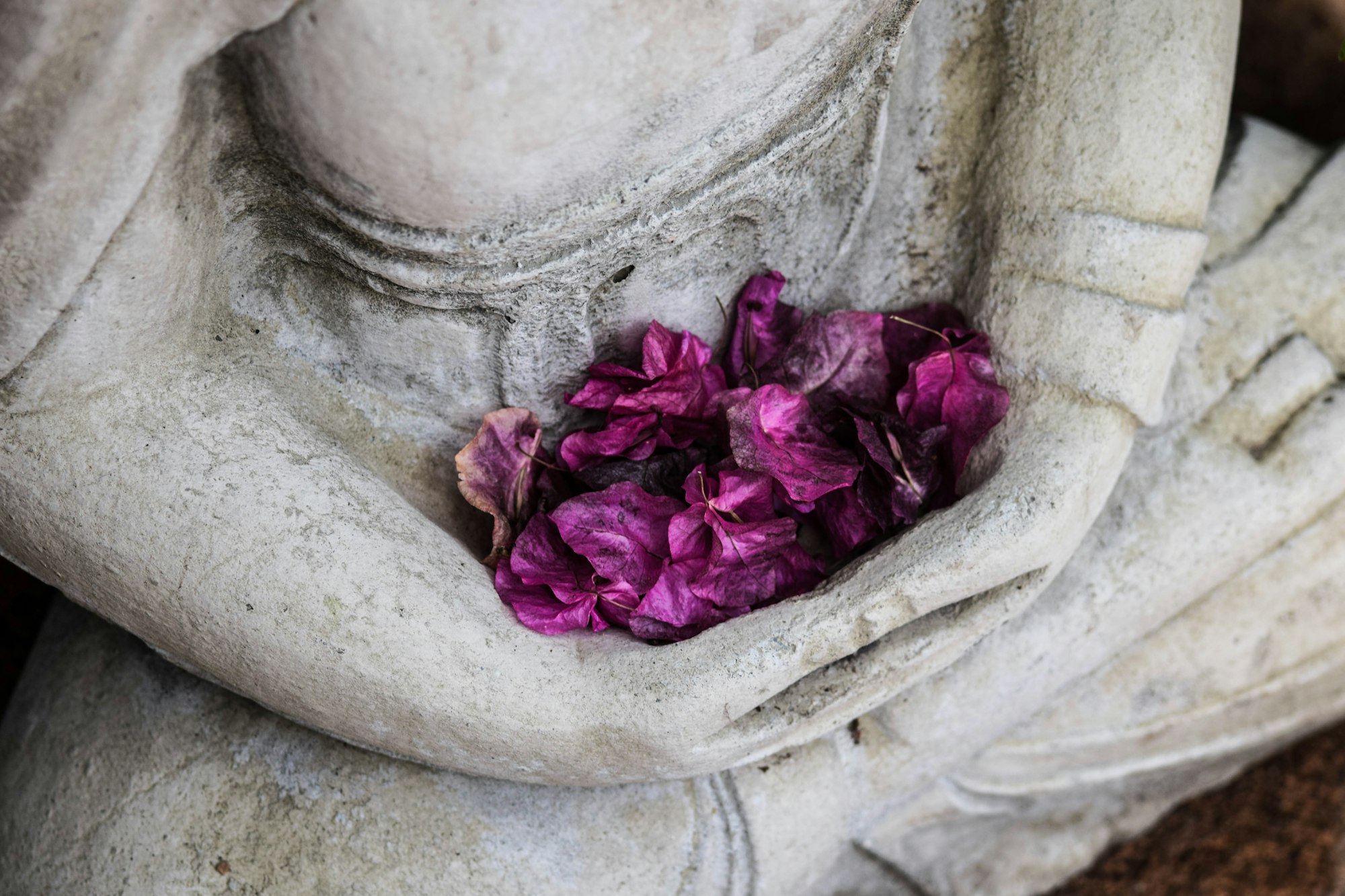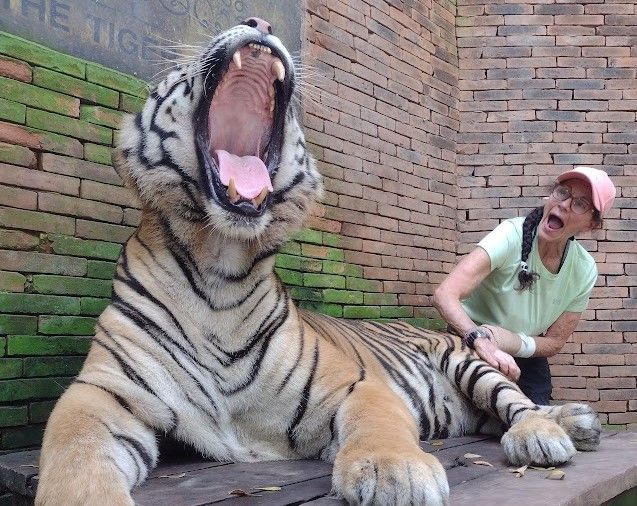
How is it that I can massage a tiger but get seriously hooked by a domesticated cat?
Because wisdom, what there is of it, is fleeting, mercurial, and capricious. Let's talk.
My left hand hurts like hell. A few minutes ago I was downstairs in this quiet Thai hotel on the island of Koh Larn where a black and white kitty, usually very calm and receptive, laid into me with claws extended. She managed to dig two nasty holes in my already-beleaguered left hand.
Well, crap. I had failed to read body language. Having been more interested in what I wanted than what the cat wanted -to be left the hell alone, apparently- I got precisely what I deserved. Cat people get this. I am mostly a dog person. Nuff said.
I stood up, laughing, pulled the cat's extended claw out of my finger. It was in there pretty deeply, and yes, still attached to the angry cat. The receptionist and I took care of things right away. Now my hand, recently insulted with surgery, has more holes in it than my head (and that's saying something), and I am supposed to go paragliding today.
There's a lesson here. Some people would punish the cat. Not the cat's fault. I'm the one who was stupid. The cat set a boundary that I didn't respect.
This morning Saga Supporter Leo Notenboom, in response to a request for feedback on what my readers want from me as I continue to build an audience, wrote this:
"Legacy and wisdom would be awesome topics to hear your thoughts on."
Given that I find other people a hell of a lot wiser, and others' legacies richer than mine, my first thought was that I'm not qualified to even address this.
But then there's this.
Superb writer, researcher, scientist and conservationist Dr. Carl Safina wrote me recently in response to an email I had sent him about elephant "sanctuaries" here in Thailand. I wrote him about my frustration as I researched these facilities. The more I looked the less I knew, the less I knew the more overwhelmed I was with the immense job of trying to offer Dear Reader any kind of value in understanding such misleading facilities.
I was achingly aware of how little I knew. To that, Safina (who is also a professor) said:
I ask students: What is the value of an education?
answers: “To learn!” “To get a good job”…
My reply: The values of an education are two: To find out where information is, and to begin to understand how little you know. Congrats on being a lifelong learner, and an “A" student. (author bolded)
While I deeply appreciate and respect Dr. Safina's generous compliment, more importantly I share this because of Leo's request.
The way I see it, I don't know diddly. Not really. What I do know is constantly changing because the world in front of me is so fluid, my role in it is just as fluid, and the definition of that world and my experience of it are both moving at the speed of life.
That leads me further. A while back when I was first exploring Maria Popova's Brainpickings, now The Marginalian, I came across this stunning piece with a quote from the late, great Toni Morrison:

Here's the quote, which I use often:
“We move from data to information to knowledge to wisdom. And separating one from the other… knowing the limitations and the danger of exercising one without the others, while respecting each category of intelligence, is generally what serious education is about.”
As a young woman I gathered and quoted information that others had gathered and earned, which I had not, and quoted it to sound wise. I was told I was wise and sucked at the teat of that lie. I see this everywhere on social media and most especially where emotional children write online, stealing others' work and making themselves sound so grounded when they don't know shit any more than I do.
Still don't know with seventy years of experience.
Which is why a few weeks ago I could do this:

and this morning manage to get myself hooked by a pissed-off housecat.
You see my point.
Or maybe you don't.
Where I'm going with this, at least as far as Leo's request is concerned, is that I am the last person I would tell anyone to look to for wisdom. I can point it out in others but I wouldn't point at myself.
Perhaps that in and of itself is wisdom, in that in fully recognizing what a black hole I am when it comes to anything particularly profound, perhaps I am indeed on that journey. About being a "straight A student?"
I dunno.
What I do believe, just from watching myself all these years (like an ongoing comedy reel, but I digress) is that education never stops.The belief that it stopped the moment we get our degree (or whatever) is the ticket to lifelong ignorance, which is what we see with far too many doctors who refuse to continue their educations long after graduation. They aren't alone.
A degree, in that regard, is little more than the starting point. Which goes straight to Dr. Safina's point. The more we research, the more we learn HOW to research, which uncovers just how vastly uninformed we really are.
There is no end point.
Here's the piece, and likely what Safina is referencing (his educational background, kindly, is much more vast than mine, just read his books, against which mine look like kindergarten scrabbles):
“The only true wisdom is in knowing you know nothing.” ― Socrates
Again. My ability to recognize this is mercurial. Like anyone else, when challenged I can be as egotistical and petty as the next guy, leaning into my vast stores of wisdom to make an argument.
And in the process make an abject fool out of myself.
However a part of me senses full well the truth of this, finds it funny, and perhaps, just perhaps, there is wisdom in that. Self-mockery is a kind of wisdom, assuming it isn't meant unkindly but as a way to not take ourselves so bloody seriously.
Something to that, too.
Is there a legacy to that?
Maybe.

My father was quite incapable of self-mockery and self-effacing humor, which would have gone a long way towards making him more accessible. It would also have been a fine thing to emulate on my part. It took me decades to get there.
My mother was a master of it. And Dad deeply disliked her for it. Something to that, too. I watched Dad mock her, and I didn't want him to mock me. So it might have taken me a bit longer to see who in my family was the wiser, and whose legacy was worth emulating.
To his credit, though, Dad was also deeply curious, with a fertile mind. That alone was a great gift. The curious have a deep understanding that they don't know everything, and are also gifted with the fearlessness to keep looking, exploring and asking. That of course varies considerably, but when we are curious, we are open to admitting that we simply don't know.
That's wise.
I am not more when I claim to know more. I am much much more when I admit I know nothing. Sounds weird, right? But consider whom you really respect, when all is said and done. Someone who claims to have all the answers (they don't) or someone who knows they don't but is very happy to help you ask much better questions? Your response to that says a lot about your value set.
If there is in fact a legacy here, it's implicit in what I wrote, above. When we model curiosity, humility, deep regard for what we don't know, the willingness to be wrong, and most especially publicly wrong, we leave a legacy. Those leaders, for me for example Nelson Mandela, whose deeply difficult circumstances carved in him a wisdom most leaders never begin to reach: to model humility.
By stepping down after a single term of service, Mandela did what today's leaders (please see Trump, Putin, Xi Jinping, Robert Mugabe, Kim Jong-Un etc.) cannot or could not do: serve with humility and wisdom.
If there is a modicum of wisdom in me, perhaps it's that I am constantly willing to be made wrong. My resistance to it, which is achingly human, is that part with which I grapple. When I win, I grow. When I lose, I shrink.
As do we all. So are there wisdom and legacy here? Hell. Don't ask me. I don't know nuttin.' But at least I find that pretty funny, as I wrap another bandaid around my hooked finger.

Because I support good causes, and because their fundraiser is coming up soon, may I kindly direct you to The Safina Center to see if they are worthy of your support. Even better, buy a ticket to annual fundraiser, or purchase something at the auction. Either way, you will be supporting the effort to educate us about the world we are in, losing too fast, and what to do about it. I support them, for they feed my curiosity, my wonder, and my deep and abiding regard for the bubble on which we tread so heavily.
*****
Dear Walkabout Saga Reader:
If my work appeals to you, may I kindly invite you to consider joining those Patreon supporters whose generosity keeps the gas in my tank as it were. Those supporters get to dictate my content calendar, we engage as a community, and this website and its content acts in service to our collective best selves.
You can explore that option here.
However you decide to partake of my writing, thank you.

Comments powered by Talkyard.